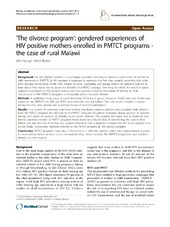| dc.contributor.author | Njunga, John | en_US |
| dc.contributor.author | Blystad, Astrid | en_US |
| dc.date.accessioned | 2015-01-14T09:09:28Z | |
| dc.date.available | 2015-01-14T09:09:28Z | |
| dc.date.issued | 2010-10-26 | eng |
| dc.identifier.issn | 1746-4358 | |
| dc.identifier.uri | https://hdl.handle.net/1956/9132 | |
| dc.description.abstract | Background For HIV infected mothers in developing countries, choosing to enroll in a prevention of mother to child transmission (PMTCT) of HIV program is supposed to represent the first step towards protecting their child from possible transmission of HIV from mother to child. Counseling and testing enable HIV infected mothers to learn about their status and to obtain the benefits of a PMTCT package. The study on which this article is based explored experiences of HIV positive women and their partners linked to Prevention of Mother to Child Transmission of HIV (PMTCT) programs in Chiradzulu district, Southern Malawi. Methods A qualitative study using in-depth interviews (IDIs), focus group discussion (FGDs) and case studies was carried at two PMTCT sites. IDIs and FGDs were recorded and transcribed. The case studies involved a deeper inquiry into the past, present and situational factors of selected participants. Results In a context of customary matrilineal kinship, matrilocal residence patterns and complete male absence from the PMTCT program, the demand by the PMTCT program for partner disclosure played up fears of rejection among men given accusations of infidelity by the wives' relatives. This situation led many men to abandon their families. Mothers enrolled in PMTCT programs hence faced not only the fear of transmitting the virus to their infants, but also the loss of income and support associated with a departed husband and the social disgrace of a ruined family. Community members referred to the PMTCT program as 'the divorce program' Conclusions PMTCT programs may vary in effectiveness in different contexts unless they fundamentally respond to socio-cultural factors as lived out in communities they intend to serve. The PMTCT program in rural southern Malawi is a case in point. | en_US |
| dc.language.iso | eng | eng |
| dc.publisher | BioMed Central | eng |
| dc.rights | Attribution CC BY | eng |
| dc.rights.uri | http://creativecommons.org/licenses/by/2.0 | eng |
| dc.title | 'The divorce program': gendered experiences of HIV positive mothers enrolled in PMTCT programs - the case of rural Malawi | en_US |
| dc.type | Peer reviewed | |
| dc.type | Journal article | |
| dc.date.updated | 2013-08-28T16:13:47Z | |
| dc.description.version | publishedVersion | en_US |
| dc.rights.holder | John Njunga et al.; licensee BioMed Central Ltd. | |
| dc.rights.holder | Copyright 2010 Njunga and Blystad; licensee BioMed Central Ltd. This is an Open Access article distributed under the terms of the Creative Commons Attribution License (http://creativecommons.org/licenses/by/2.0), which permits unrestricted use, distribution, and reproduction in any medium, provided the original work is properly cited. | |
| dc.source.articlenumber | 14 | |
| dc.identifier.doi | https://doi.org/10.1186/1746-4358-5-14 | |
| dc.identifier.cristin | 786328 | |
| dc.source.journal | International Breastfeeding Journal | |
| dc.source.40 | 5 | |
| dc.source.14 | 1 | |

